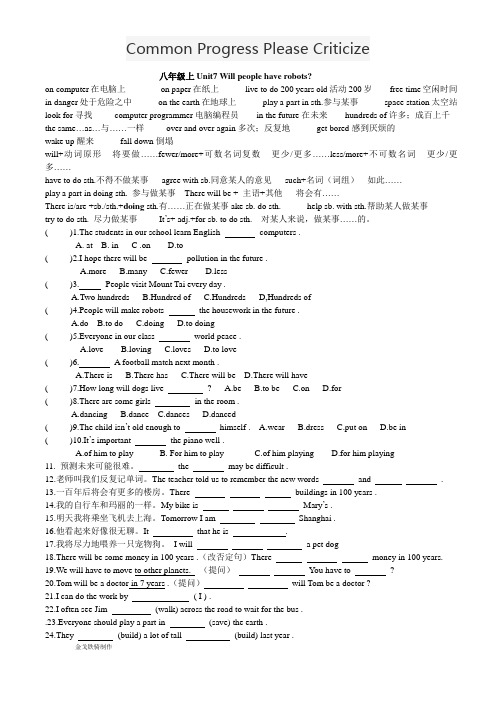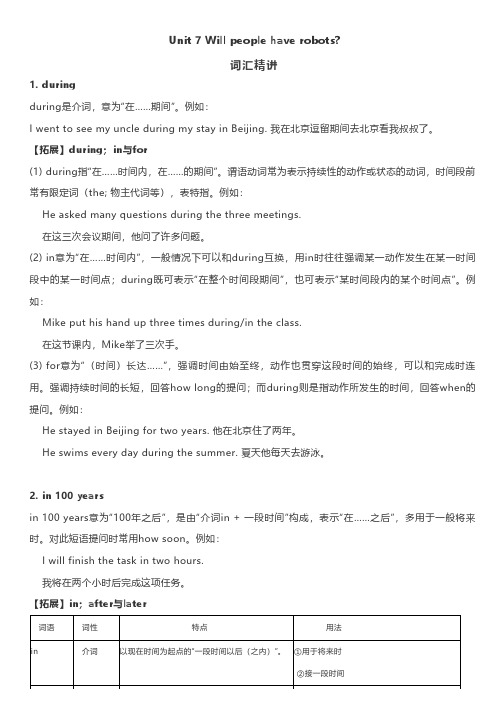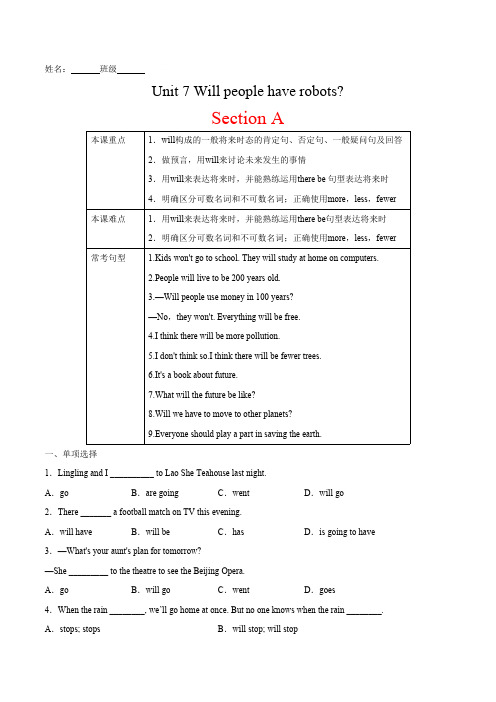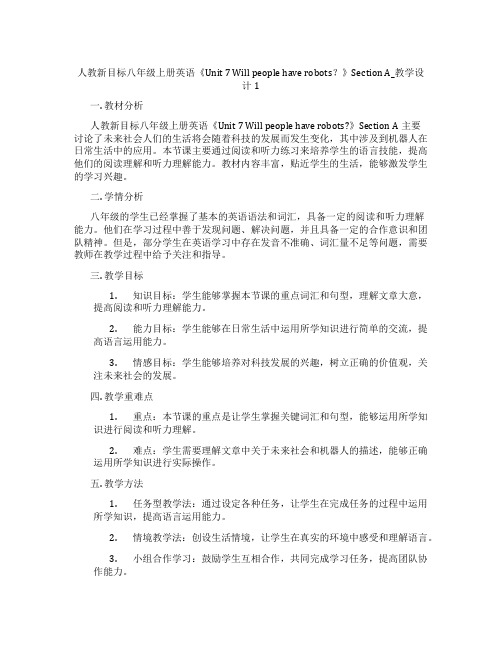人教版英语八年级上册Unit7WillpeoplehaverobotsSectionA(1a-2d)
人教版英语八年级上册Unit7Willpeoplehaverobots

八年级上Unit7 Will people have robots?on computer在电脑上on paper在纸上live to do 200 years old活动200岁free time空闲时间in danger处于危险之中on the earth在地球上play a part in sth.参与某事space station太空站look for寻找computer programmer电脑编程员in the future在未来hundreds of许多;成百上千the same…as…与……一样over and over again多次;反复地get bored感到厌烦的wake up醒来fall down倒塌will+动词原形将要做……fewer/more+可数名词复数更少/更多……less/more+不可数名词更少/更多……have to do sth.不得不做某事agree with sb.同意某人的意见such+名词(词组)如此……play a part in doing sth. 参与做某事There will be + 主语+其他将会有……There is/are +sb./sth.+doing sth.有……正在做某事ake sb. do sth. help sb. with sth.帮助某人做某事try to do sth. 尽力做某事It’s+ adj.+for sb. to do sth. 对某人来说,做某事……的。
( )1.The students in our school learn English computers .A. atB. in C .on D.to( )2.I hope there will be pollution in the future .A.moreB.manyC.fewerD.less( )3. People visit Mount Tai every day .A.Two hundredsB.Hundred ofC.Hundreds D,Hundreds of( )4.People will make robots the housework in the future .A.doB.to doC.doingD.to doing( )5.Everyone in our class world peace .A.loveB.lovingC.lovesD.to love( )6. A football match next month .A.There isB.There hasC.There will beD.There will have( )7.How long will dogs live ? A.be B.to be C.on D.for( )8.There are some girls in the room .A.dancingB.danceC.dancesD.danced( )9.The child isn’t old enough to himself . A.wear B.dress C.put on D.be in( )10.It’s important the piano well .A.of him to playB. For him to playC.of him playingD.for him playing11. 预测未来可能很难。
初中英语人教版八年级上册《Unit7 Will people have robots Section

3c
Complete the chart and discuss it with your partner.
A: What do you want to be when you grow up? B: I want to be a reporter. A: How are you going to do that? B: I’m going to write articles and send them to
可数名词 1. more +
不可数名词
2. less + 不可数名词
3. fewer + 可数名词
more songs 更多的歌曲
more juice 更多的果汁
less news 更少的消息
fewer actors 更少的演员
People will have less free time.
人们将会有更少的闲暇时间。
1) be going to 表示近期、眼下就要产生的事情, will 表示的将来时间则较远一些。 He is going to write a letter tonight. He will write a book one day.
2) be going to 表示根据主观判定将来肯定产生的 事情,will表示客观上将来势必产生的事情。 He is seriously ill. He is going to die. He will be twenty years old.
tomorrow?
A.does; like
B.is; liking
C.will; like
D.will; be like
4. Don't ___A_____ water, or we will have no clean water
人教新目标八年级上册英语《Unit 7 Will people have robots?》Secti

人教新目标八年级上册英语《Unit 7 Will people have robots?》Section B_教学设计2一. 教材分析《Unit 7 Will people have robots?》Section B 包含了一个阅读理解和两个活动。
本节课主要通过阅读一篇关于未来机器人的文章,让学生掌握一般将来时的用法,并能够运用本课所学知识进行简单的未来预测。
文章内容丰富,插图生动,能够激发学生的学习兴趣。
二. 学情分析八年级的学生已经掌握了英语学习的基本语法和词汇,对于一般将来时也有了一定的了解。
但部分学生在阅读理解方面仍有困难,需要教师的引导和帮助。
此外,学生们的口语表达和写作能力也需要进一步提高。
三. 教学目标1.能够理解文章的主旨大意,掌握一般将来时的用法。
2.能够运用本课所学知识进行简单的未来预测。
3.提高学生的阅读理解能力和口语表达能力。
四. 教学重难点1.一般将来时的用法。
2.提高阅读理解能力,理解文章的主旨大意。
五. 教学方法采用任务型教学法,让学生在完成任务的过程中,自然而然地学习和掌握知识。
同时,运用启发式教学法,引导学生主动思考,提高他们的阅读理解和口语表达能力。
六. 教学准备1.打印文章,准备教材。
2.准备与文章内容相关的图片或视频,以便在课堂上进行展示。
3.准备一些问题,用于引导学生进行思考和讨论。
七. 教学过程1.导入(5分钟)利用图片或视频展示未来机器人的场景,引导学生思考:Do you like robots? Why? 让学生自由发言,表达自己的观点。
2.呈现(10分钟)给学生分发文章,让他们独立阅读。
在阅读过程中,教师可适时提出一些问题,帮助学生理解文章内容。
例如:What will happen in the future?How do people feel about robots?3.操练(10分钟)学生分组,根据文章内容,进行角色扮演。
要求学生运用一般将来时进行对话,模拟未来的场景。
Unit+7+Will+people+have+robots语法知识突破 人教版英语八年级上册

人教版英语八年级上册第七单元Unit 7 Will people have robots?语法知识突破在英语学习中,语法学习,既是一个重点,也是一个难点,每个单元的设计都是围绕一定话题,突破语法和句子知识展开的。
接下来,我们来呈现一下人教版英语八年级上册第七单元的语法如何突破?一、从标题看语法本单元的标题是:Unit 7 Will people have robots?从标题可以看出,本单元主要谈论“未来”,所以,话题就是“对于未来的设想”,牵涉到一般将来时“will+动词原形”的用法,接下来我们就来捋一捋。
语法突破:英语里面,当我们要表示将来的事情(稍微遥远一点的将来)的时候,要用到“will+动词原形”,这个单元,我们介绍这种用法:1、“will + 动词原形”与“be going to + 动词原形”的区别。
be going to do 表示将要发生的事情,通常是经过计划和准备的,有主观判断;而will do 表示将来时间较远的事情,通常客观上将会发生,没有明确的计划和准备。
例如:We will visit our aunt next Friday. \ People will have robots in their homes in the future. 2、关于一般将来时“will+动词原形”的肯定句、否定句和一般疑问句、特殊疑问句。
肯定句:主语+will +动词原形+ 其它。
例如:People will have robots in their homes. 人们家里会有机器人。
否定句:主语+will +not(可以缩写成won’t)+动词原形+其它。
例如:People won’t usemoney , everything will be free. 人们不会再使用钱,一切都是免费的。
一般疑问句:Will +主语+ 动词原形+ 其它?例如:Will people use the subway less?人们会少用地铁吗?特殊疑问句:特殊疑问词+ will +主语+ 动词原形+ 其它?例如:What will robots doin the future? 机器人在未来会做什么?3、当will用于there be 句型there be句型表示“有”,当表示“将会有”的时候,可以用there will be 或者thereis \ are going to be。
人教版英语八年级上册Unit7《Will people have robots_》知识点

Unit 7 Will people have robots?词汇精讲1. duringduring是介词,意为“在……期间”。
例如:I went to see my uncle during my stay in Beijing. 我在北京逗留期间去北京看我叔叔了。
【拓展】during;in与for(1) during指“在……时间内,在……的期间”。
谓语动词常为表示持续性的动作或状态的动词,时间段前常有限定词(the; 物主代词等),表特指。
例如:He asked many questions during the three meetings.在这三次会议期间,他问了许多问题。
(2) in意为“在……时间内”,一般情况下可以和during互换,用in时往往强调某一动作发生在某一时间段中的某一时间点;during既可表示“在整个时间段期间”,也可表示“某时间段内的某个时间点”。
例如:Mike put his hand up three times during/in the class.在这节课内,Mike举了三次手。
(3) for意为“(时间)长达……”,强调时间由始至终,动作也贯穿这段时间的始终,可以和完成时连用。
强调持续时间的长短,回答how long的提问;而during则是指动作所发生的时间,回答when的提问。
例如:He stayed in Beijing for two years. 他在北京住了两年。
He swims every day during the summer. 夏天他每天去游泳。
2. in 100 yearsin 100 years意为“100年之后”,是由“介词in + 一段时间”构成,表示“在……之后”,多用于一般将来时。
对此短语提问时常用how soon。
例如:I will finish the task in two hours.我将在两个小时后完成这项任务。
人教版英语八年级上册Unit7Willpeoplehaverobots?SectionA含答案

姓名:班级Unit 7 Will people have robots?Section A本课重点1.will构成的一般将来时态的肯定句、否定句、一般疑问句及回答2.做预言,用will来讨论未来发生的事情3.用will来表达将来时,并能熟练运用there be 句型表达将来时4.明确区分可数名词和不可数名词;正确使用more,less,fewer 本课难点1.用will来表达将来时,并能熟练运用there be句型表达将来时2.明确区分可数名词和不可数名词;正确使用more,less,fewer 常考句型 1.Kids won't go to school. They will study at home on computers.2.People will live to be 200 years old.3.—Will people use money in 100 years?—No,they won't. Everything will be free.4.I think there will be more pollution.5.I don't think so.I think there will be fewer trees.6.It's a book about future.7.What will the future be like?8.Will we have to move to other planets?9.Everyone should play a part in saving the earth.一、单项选择1.Lingling and I __________ to Lao She Teahouse last night.A.go B.are going C.went D.will go2.There _______ a football match on TV this evening.A.will have B.will be C.has D.is going to have 3.—What's your aunt's plan for tomorrow?—She _________ to the theatre to see the Beijing Opera.A.go B.will go C.went D.goes4.When the rain ________, we’ll go home at once. But no one knows when the rain ________. A.stops; stops B.will stop; will stopC.stops; will stop D.will stop; stops5.If we do nothing to protect giant pandas, there ________ no more giant pandas in the future. A.will have B.will has C.will be D.will be going to have 6.—Will you go to the cinema with me tomorrow?—Sorry, I _____ skating with Tom.A.go B.goes C.went D.will go7.What will the future ________ like?A.is B.are C.am D.be8.— Will there be more schools in 20 years’ time?—________. I think students will study by Internet at home.A.No, there aren’t B.Yes, there are C.No, there won’t D.Yes, there will 9.The air ________ here makes me uncomfortable.A.discussion B.relationship C.pollution D.information 10.——How soon will he come back? ——___________ two days.A.Before B.After C.In D.For二、用所给词的适当形式填空。
人教新目标八年级上册英语《Unit 7 Will people have robots?》Secti

人教新目标八年级上册英语《Unit 7 Will people have robots?》Section A_教学设计1一. 教材分析人教新目标八年级上册英语《Unit 7 Will people have robots?》Section A主要讨论了未来社会人们的生活将会随着科技的发展而发生变化,其中涉及到机器人在日常生活中的应用。
本节课主要通过阅读和听力练习来培养学生的语言技能,提高他们的阅读理解和听力理解能力。
教材内容丰富,贴近学生的生活,能够激发学生的学习兴趣。
二. 学情分析八年级的学生已经掌握了基本的英语语法和词汇,具备一定的阅读和听力理解能力。
他们在学习过程中善于发现问题、解决问题,并且具备一定的合作意识和团队精神。
但是,部分学生在英语学习中存在发音不准确、词汇量不足等问题,需要教师在教学过程中给予关注和指导。
三. 教学目标1.知识目标:学生能够掌握本节课的重点词汇和句型,理解文章大意,提高阅读和听力理解能力。
2.能力目标:学生能够在日常生活中运用所学知识进行简单的交流,提高语言运用能力。
3.情感目标:学生能够培养对科技发展的兴趣,树立正确的价值观,关注未来社会的发展。
四. 教学重难点1.重点:本节课的重点是让学生掌握关键词汇和句型,能够运用所学知识进行阅读和听力理解。
2.难点:学生需要理解文章中关于未来社会和机器人的描述,能够正确运用所学知识进行实际操作。
五. 教学方法1.任务型教学法:通过设定各种任务,让学生在完成任务的过程中运用所学知识,提高语言运用能力。
2.情境教学法:创设生活情境,让学生在真实的环境中感受和理解语言。
3.小组合作学习:鼓励学生互相合作,共同完成学习任务,提高团队协作能力。
六. 教学准备1.教师准备:备好相关教学资料,如PPT、教学视频等。
2.学生准备:预习本节课的单词和句型,提前了解相关背景知识。
七. 教学过程1.导入(5分钟)教师通过向学生展示一些机器人图片,引导学生谈论机器人,激发学生的学习兴趣。
八年级英语上册 Unit 7 Will people have robots?(第2课时)说课稿

八年级英语上册 Unit 7 Will people have robots?(第2课时)说课稿一. 教材分析《八年级英语上册》Unit 7 “Will people have robots?” 是人教版新目标英语教材的一个单元。
本单元主要围绕未来科技的发展,特别是机器人在日常生活中的应用进行讲解。
通过本单元的学习,学生可以掌握一般将来时的被动语态,提高自己的听说读写能力,并激发他们对未来科技的想象和思考。
二. 学情分析八年级的学生已经掌握了英语学习的基本语法和词汇,具备一定的听说读写能力。
他们对新科技充满好奇,善于接受新鲜事物,但同时也可能对一些抽象的概念和语言表达感到困惑。
因此,在教学过程中,我们需要关注学生的个体差异,因材施教,激发他们的学习兴趣和积极性。
三. 说教学目标根据《义务教育英语课程标准》和教材内容,本节课的教学目标如下:1.知识目标:学生能够掌握一般将来时的被动语态,理解与未来科技相关的词汇和表达。
2.能力目标:学生能够在真实情境中运用所学知识进行交流,提高听说读写能力。
3.情感目标:激发学生对未来的想象和思考,培养他们对科技发展的积极态度。
四. 说教学重难点1.教学重点:学生能够熟练运用一般将来时的被动语态进行表达。
2.教学难点:学生能够准确理解与未来科技相关的词汇和表达,以及在真实情境中运用所学知识进行交流。
五. 说教学方法与手段本节课采用任务型教学法,结合情境教学法和分组合作学习法,利用多媒体教学手段,激发学生的学习兴趣,提高他们的参与度和积极性。
六. 说教学过程1.导入:通过展示一段关于未来科技的短片,引发学生对未来的想象,激发他们的学习兴趣。
2.呈现:教师通过PPT展示本节课的主要内容,引导学生关注一般将来时的被动语态和与未来科技相关的词汇。
3.操练:学生分组进行角色扮演,运用所学知识进行对话,教师给予指导和反馈。
4.巩固:学生完成一组有关未来科技的练习题,检测他们对知识的掌握程度。
- 1、下载文档前请自行甄别文档内容的完整性,平台不提供额外的编辑、内容补充、找答案等附加服务。
- 2、"仅部分预览"的文档,不可在线预览部分如存在完整性等问题,可反馈申请退款(可完整预览的文档不适用该条件!)。
- 3、如文档侵犯您的权益,请联系客服反馈,我们会尽快为您处理(人工客服工作时间:9:00-18:30)。
Unit 7 Will people have robots?
Section A (1a—2d)
Ⅰ. 根据句意,从方框中选择恰当的单词填空,有的需要变换形式。
paper, pollute, planet, plant, environment
1. Don’t thro w (扔) dirty things into the river. They will ________ the river.
2. I wonder if there is life on other ________.
3. Mom, can I draw a picture on the ________?
4. ________ need light (光) and water.
5. Young children often feel happier in the home ________.
Ⅱ. 根据汉语意思完成英语句子,每空词数不限。
1. 我认为人们不能活到150岁。
I don’t think people can _________________ 150 years old.
2. 一些动物处境危险,我们应该保护它们。
Some animals are _________________. We should protect them.
3. 今天人们居住在地球上,有一天他们会居住在月球上。
Today people live _________________ and one day they will live on the moon.
4. 越来越多的人搬迁到城市。
More and more people are _________________ cities.
5. 所有孩子都应该尽一份力拯救他们的家园。
All children should _________________ saving their homes.
Ⅲ. 根据对话内容,从方框中选择恰当的选项补全对话,其中有一项多余。
A: Morning, Nick. (1)_______
B: I have no plans yet. What about you?
A: (2)_______
B: That’s good. It’s good for our city environment.
A: Yes. (3)_______
B: Yeah! Who will go with you?
A: My teacher Ms. Jones and my classmates. (4)_______
B: Sure, I’d love to. Where shall we meet?
A: (5)_______ You must get there before eight.
B: OK, see you then.
A. In our classroom.
B. Would you like to join us?
C. I will go to Jinci Farm to plant trees.
D. Would you like to go shopping with us?
E. What are you going to do tomorrow?
F. The more trees, the fresher the air will be.
参考答案:
Ⅰ. 1. pollute 2. planets 3. paper 4. Plants 5. environment
Ⅱ. 1. live to be 2. in danger 3. on the earth 4. moving to 5. play a part in Ⅲ. 1-5 ECFBA。
